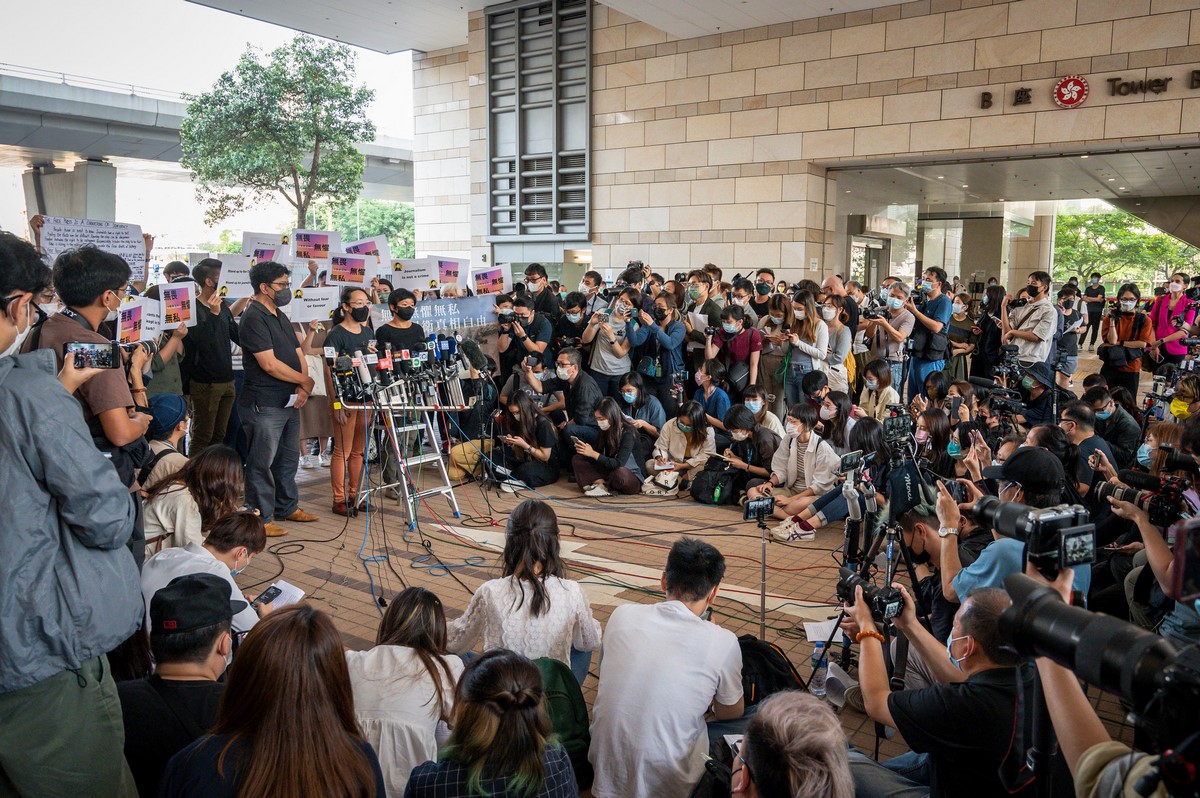
Journalist Bao Choy meets the press after she was found guilty of two counts of making false statements on April 22, 2021. Photo: Studio Incendo via HKFP. CC BY 2.0.
The original version of this report was written by Irene Chan and published in Hong Kong Free Press (HKFP). The following edited version has been published on Global Voices as part of a content partnership agreement with HKFP.
After leaving Hong Kong’s top court on a warm June morning, Bao Choy was overwhelmed by jubilation and sadness.
Embroiled in a legal battle since 2020, the veteran journalist had just won an unexpected victory: the Court of Final Appeal quashed her conviction for making false statements linked to accessing vehicle records for a documentary about the 2019 Yuen Long mob attack.
The judgement was hailed as a rare victory for press freedom, seen as increasingly under pressure in the city. However, it doesn’t mean things will simply return to normal, Bao Choy said.
I won in the sense of social justice. Yet we’re very clear that even with the top court’s ruling, the government can do anything to change the game. It is not a long-lasting victory.
Choy Yuk-ling, now 39, is better known by her nickname “Bao”. After her arrest in late 2020, she joined the Nieman Fellowship at Harvard University, then returned to her home city and established a new media outlet called The Collective — handling all the procedures associated with her court case along the way.
The Yuen Long mob attack on protesters and other passengers was seen as one of the key moments of the months-long unrest that shook Hong Kong in 2019, sparked by protests against a controversial amendment to the city’s extradition bill.
On July 21, 2019, over 100 rod-wielding men in white stormed Yuen Long MTR station, leaving 45 people injured — including journalists, protesters, commuters and pro-democracy lawmaker Lam Cheuk-ting. Police were criticised for their slow response to the incident, with some officers seen leaving the scene or interacting with the white-clad men.
Bao was making a documentary (see the video below) about the events that night for “Hong Kong Connection,” a programme on government-funded broadcaster RTHK. To trace the owners of vehicles pictured at the scene of the attack, and to establish who might have been involved, Bao and her team accessed vehicle records from a government website. This led to her arrest.
After her court victory, she did not celebrate a win. “The damage has already been done,” she said.
The police said they followed the law [to arrest me]. But the outcome was one stone, several birds — it hit “Hong Kong Connection,” and it hit RTHK.
Bao said she did not see herself as making waves. Instead, like many Hongkongers, she feels she is simply struggling against the tide of change sweeping through the city.
‘A luxury’
Five months after her arrest, Bao was convicted of “knowingly making a false statement” to access vehicle owner information for the documentary. She was fined HKD 6,000 (USD 766) at the West Kowloon Magistrates’ Courts.
She shed tears when she walked out of the courtroom as crowds, including around one hundred journalists, chanted: “Journalism is not a crime!”
In the week following her conviction, she agonised about whether to appeal,
If I filed an appeal, I should be ready to go to the top court. That usually means a commitment of around three years, and I would have to pay a sum of seven digits for legal fees if I lose in the top court, as I would have to pay legal fees for the other side.
While her worried family advised her to be “rational” and just let the matter go since she had not been sentenced to jail, Bao felt her conviction was not just a personal matter but an attack on the entire media industry.
In Hong Kong, you must declare your reasons for wanting to obtain vehicle data on the government-run website. From a scroll-down menu, Bao clicked “other traffic and transport-related matters,” which the prosecutor argued did not include journalism.
Driven by a sense of responsibility to her profession and a desire to defend press freedom, she said her “sensibility prevailed.”
People in the industry would not have dared to access vehicle data with my conviction. If I didn’t (file an appeal), I would probably regret it. And that’s something irreparable.
When she lost her appeal in the High Court last November, her legal team immediately filed a second appeal.
Since her conviction, Hong Kong has seen the closure of Apple Daily newspaper, Stand News and Citizen News. When Bao walked out of the High Court, the number of journalists awaiting her was reduced to around 10.
Bao compared what she had faced with other jailed journalists and made up her mind to walk till the end of the legal battle.
All along, what I dealt with was mainly about legal fees. It is a luxury for me to resist!



